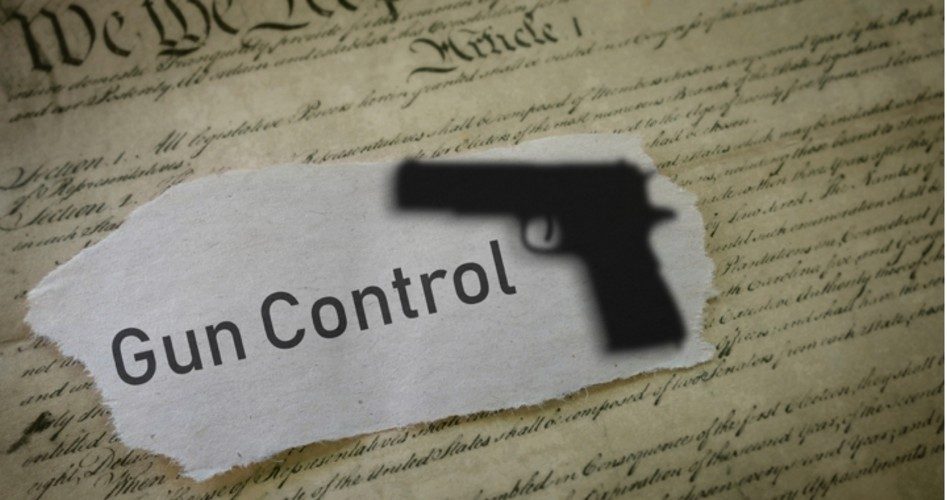
If you’re concerned about violence with guns, never fear, big “woke” corporate millionaires are here — to save you from yourself. The latest on this front is that 145 chief executives, reports CNBC, “wrote a letter to the Senate on Thursday, urging the legislative body to take action on gun safety,” with “gun safety” being a euphemism for removing freedom.
CNBC continues:
The letter notes recent gun violence in Chicago, Newport News, Virginia, and other places, calling it a “public health crisis.” But the leaders also say that gun violence is preventable, and lawmakers can step in to head off tragedies.
“That’s why we we [sic] urge the Senate to stand with the American public and take action on gun safety by passing a bill to require background checks on all gun sales and a strong Red Flag law that would allow courts to issue life-saving extreme risk protection orders,” they wrote in the letter.
Red flag laws, which are also known as extreme risk laws, allow family members or law enforcement to petition a court to prevent someone temporarily from obtaining firearms.
… The signers of the letter include the CEOs of well-known companies Uber, Levi Strauss, Gap, Lyft and Beyond Meat.
{modulepos inner_text_ad}
Other signatories include Edward Stack, CEO of Dick’s Sporting Goods; several figures from Bain Capital, which was founded by Senator Mitt Romney; and Thrive Capital’s Joshua Kushner, brother of Jared Kushner, advisor and son-in-law of President Trump.
Other CEOs didn’t sign the letter, often for political reasons. Notably, Facebook’s Mark Zuckerberg refused; though he supports the gun laws in question, he was concerned that weighing in would intensify the federal scrutiny his company is already under. Google, Apple, and banks such as Citigroup and Bank of America didn’t join either, also for self-serving reasons.
Many find it ironic, and maddening, that super-rich people — who can afford bodyguards and life in a gated, ivory tower community — would try to make it more difficult for average people to defend themselves. It is, after all, easy to be idealistic when you don’t have to live with your ideals. The kicker here, however, is that these CEOs stated concerns are driven less by reason and more by passion, which, Ben Franklin warned, governs, but “never governs wisely.” And we can know they’re thus driven because their concerns have little relationship to reality.
The CEOs’ letter states, for instance, “Doing nothing about America’s gun violence crisis is simply unacceptable,” and the New York Times quotes Levi Strauss’ Chip Bergh as saying that “gun violence is impacting everybody’s business now.”
Yet as the Times itself reported in its 2014 piece “The Assault Weapon Myth,” “Most Americans do not know that gun homicides have decreased by 49 percent since 1993 as violent crime also fell.”
So was there a “gun violence crisis” in 1993? If not, there can’t be one in our 50-percent-lower-murder-rate time. If so, why didn’t these companies take this anti-gun stand back then? What has changed isn’t the violence, but the political calculations.
Moreover, violence with weapons has for at least 50 years impacted businesses: The small ones driven out of mainly black urban areas by criminality. Interestingly, though, these rich CEOs never seemed concerned about that.
Then consider some companies’ policies. Walmart “announced that it was removing certain ammunition and guns from its shelves and would discourage ‘open carry’ in its stores,” the Times writes. “Other retailers followed suit by changing their open-carry policies, including Kroger, CVS, Walgreens and the Wegmans grocery chain.” And Uber “bans guns from its vehicles, either for drivers or passengers,” the paper also informs.
Yet how can discouraging “open carry” or banning guns from cars save even one life? Do murderers and robbers care about corporate rules? If anything, a sense that the good people aren’t armed would make these businesses more attractive targets.
Clearly, this is about value signaling, about appearing as if you care and are taking action, about making gun-queasy customers feel more secure. It’s not about reality.
Speaking of which, while the homicide rate has declined, high-profile mass shootings — scary events that drive this current anti-gun hysteria — have not. Yet is the hysteria justified?
Consider that the lifetime odds are far greater of dying in a motor vehicle than any mass shooting, 1 in 108 vs. 1 in 11,125. The odds are also greater that a person will die as a result of a bicycle accident (1 in 4,030); a force of nature (1 in 2,586); suicide (1 in 92); drugs (1 in 72); assault with a sharp object (1 in 2,517); falling (1 in 122); airplane, boat, and spaceship incidents (1 in 2,499); or a host of diseases. So is the gun-death sky really falling, Chicken Little?
The Times also tells us that today’s “business leaders are increasingly carving out positions on social issues.” Why? First, a new generation of social-justice-warrior types has entered the corporate world; second, our country’s leftward drift has made such stances more advantageous.
Related to this, however, is that many companies today are collaborating with the Left for the same reason why 1930s businesses worked with the Nazis: The money hungry pander to the powerful.
Remember, big business knows that Democrats, unlike Republicans, aren’t reluctant to use Big Brother to regulate and control the private sector. So it’s a good idea to kiss their ring and buy good will. This helps explain why Walmart — which the Left had loved to hate — adopted their anti-gun policies. You don’t hear leftists criticizing Walmart anymore, do you?
As for the measures advocated in the CEOs’ letter, note that all commercial gun sales have long required background checks; only personal sales don’t, such as when you sell a firearm to a friend.
Second, “Red Flag” laws suspend a person’s constitutionally protected rights without even the bringing of criminal charges (discussed in the video below). What’s next? Suspending an American’s First Amendment rights because he’s accused of having an assault mouth?
In reality, more than a “gun violence crisis” we have a big business crisis. For it’s “simply unacceptable” when people who care more about cash than killing are shaping our laws.
Photo: zimmytws/iStock/Getty Images Plus



